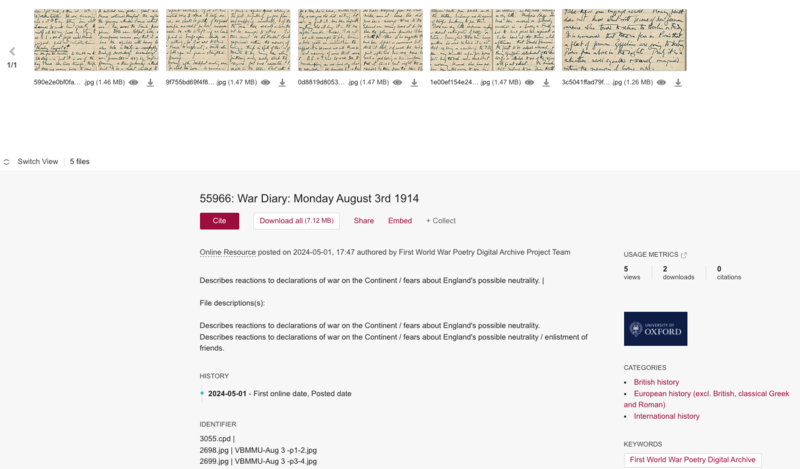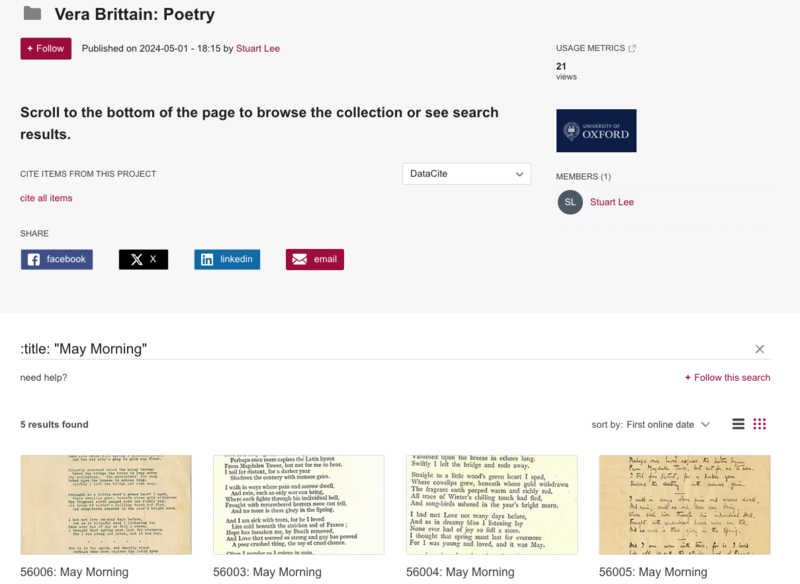Edward Thomas
‘If the war goes on I believe I shall find myself a sort of Englishman, though neither poet or soldier’
Letter to Walter de la Mare, 30th August 1914
Biography
https://widgets.figshare.com/articles/25691139/embed?show_title=1Edward Thomas (1878–1917)
Philip Edward Thomas was born in Lambeth, London in 1878, of Welsh descent. He was educated at St Paul's college and then Lincoln College at Oxford University, where he studied history. A prolific writer of prose (including biographies of Richard Jefferies, Swinburne, and Keats), and a moderately successful journalist, his work concentrated on the image of England and the countryside. Thomas suffered from severe bouts of depression and recurrent psychological breakdowns, feeling creatively repressed by the endless reviews and ill-paid commissions he had to do to support himself and his family. Although happier with his writings on countryside that mixed observation, information, literary criticism, self-reflection and portraiture, Thomas still felt that his style was not original enough to merit recognition and struggled to find a form which suited him. It was only after a meeting with Robert Frost, the American poet, in 1913 that he devoted himself fully to the medium of poetry. From 1914 the First World War became a shifting presence in Thomas’ poetry, acting to concentrate his mind on a vision of England, leading him to write ‘war poetry’ long before he reached the trenches.
His poetry also acted as the ‘metaphysical counterpart’ to his decision to join the army (Longley, 2008, 18). After what Thomas described as ‘the natural culmination of a long series of moods & thoughts’ (a letter to Gordon Bottomley) he enlisted in 1915 with the Artists' Rifles as a private. Thomas was sent to Hare Hall Camp at Romford, Essex, where he worked as a map-reading instructor and was promoted to lance-corporal, then full corporal. Given his age, Thomas could have honourably remained in this post throughout the War, however in September 1916 he began training in the Royal Garrison Artillery and when he was commissioned second lieutenant in November he volunteered for service overseas. Thomas left England for France in January 1917 and served with no. 244 siege battery. On the 9th April Thomas was killed by a shell blast in the first hour of the Battle of Arras at an observation post whilst directing fire. Thomas wrote no poetry that we know of during his time in France, however his small pocket diary shows him to be a changed man, an efficient officer and a prolific energised writer.
Thomas is buried in Agny military cemetery on the outskirts of Arras. He was survived by his wife Helen and three children, Bronwen, Merfyn and Myfanwy. Thomas did not live to see Poems (1917), published under his pseudonym, Edward Eastaway. In just under two years he had written over 140 poems.
| Author | Kate Lindsay |
|---|---|
| Sources |
|
The Edward Thomas Collection
User Guide for the First World War Poetry Digital Archive on Oxford University's SDS Platform
The SDS (Sustainable Digital Scholarship) platform, powered by FigShare, is a robust digital repository used by Oxford University to host a wide range of academic content. It ensures long-term preservation and accessibility of scholarly resources. This user guide will help you navigate the First World War Poetry Digital Archive stored within this platform.
Navigating the Archive
-
Select a Category below: Begin by choosing a category from the available tabs below, such as poetry, correspondence, etc. This selection will link you to specific types of documents within the archive.
-
Accessing Items: Once you click on an item, a new tab will open in your browser directing you to the SDS page containing the selected record. If there are multiple versions of an record, such as a manuscript and a typescript of a poem, the link might direct you to a search result page on SDS where all versions are listed.
-
Example of the page directly to the record:

-
Example of the page when there are multiple versions of a record:

-
-
Browsing Collections: Besides specific searches, you can also browse the entire collections on the SDS platform. This feature allows you to explore additional materials that may not be directly linked to but are part of the First World War Poetry Digital Archive.
Please Note:
- Accessibility: Archive files from recent years are accessible using assistive technologies. Older files, particularly those scanned from original printed volumes, may not be fully accessible and are recommended to be downloaded for optimal viewing.
- Access Restrictions: Some documents, especially those containing sensitive information, are only available to university members through a single sign-on account. Publicly available files can be accessed without such restrictions, adhering to data protection guidelines.
- Assistance Requests: For specific access needs or inquiries, such as obtaining content in accessible formats or accessing restricted files without a single sign-on, please contact the appropriate administrative support via email.
Citing and Downloading Records
- To cite an item, click the 'Cite' button under the item's title in SDS. See below:

- Download Options: You can download files directly from the SDS platform. This is recommended for large files or when a detailed review of documents is required.



